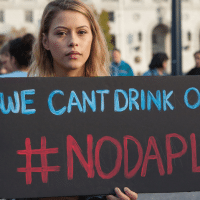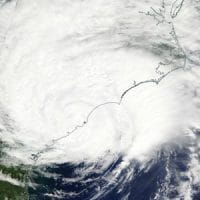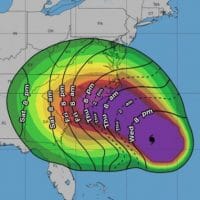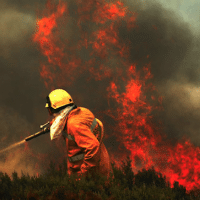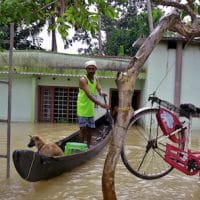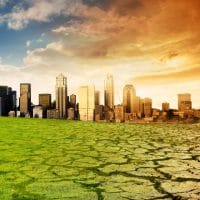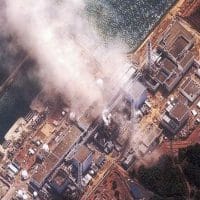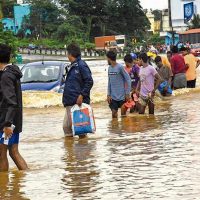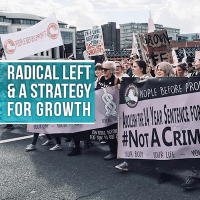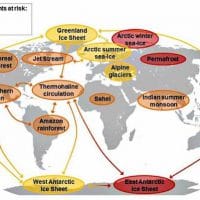-
The Battle for Paradise
Naomi Klein gives a stirring account of the struggle against disaster capitalism in Puerto Rico after 2017’s Hurricane Maria, finds Ellen Graubart.
-
Marx, socialism, and ecology
Marx’s thought with regard to ecology has been neglected for a long time or has been misunderstood, both within and outside Marxism. Saito shows that Marx’s concern with the relation between humankind and nature is already present at an early stage of his thinking.
-
Climate change made Florence a monster—but media failed to tell that story
That Hurricane Florence broke rainfall records for tropical storms in both North and South Carolina shouldn’t be surprising, as global climate change has increased extreme precipitation in all areas of the continental United States.
-
The politics of hurricanes
Climate change catastrophe is, as this article is written, facing hundreds of thousands on the eastern seaboard of the United States and on the Philippines island of Luzon, as Hurricane Florence and Typhoon Mangkhut make landfall simultaneously. Mangkhut also threatens Hong Kong, South China and maybe Vietnam.
-
What happens when the ‘alt-right’ starts believing in climate change?
What does it mean for whites if climate change is real?
-
For greenhouse gases, half is not good enough
Although a truth of science is not equivalent to the consensus of scientists, neither historically nor now, there are times when scientific facts (or truths) are of such compelling importance that a near consensus of scientific practitioners ought to be regarded as fact. Yes, when I began smoking cigarettes at age fifteen there was something […]
-
The Trump Administration’s continued attack on science
As of August 14, the federal government has attempted to censor, misrepresent, and otherwise stifle science over 150 times.
-
Nicaragua: ‘Scientific American should try sticking to science’
The last thing we need is to introduce all of the world’s political conflicts into climate change policy, writes Dr. Paul Oquist, Nicaragua’s chief climate negotiator.
-
The trade deal which fines governments for acting on climate change
An obscure agreement–the Energy Charter Treaty–allows energy firms to sue countries who take action to stop climate breakdown.
-
In battling floods, Kerala is also forced to fight the hostility of the Indian government
THE communist-ruled Indian state of Kerala, hit by the most severe rains and floods in nearly a century, has had to overcome not just nature’s fury but also the active hostility of the central government in Delhi led by the far-right Bharatiya Janata Party (BJP).
-
There is still time for an ecological revolution to prevent hothouse earth
The only thing that could alter this dire situation, all over the world, is the rise of another power in society. We need not millions but hundreds of millions of people, necessarily predominantly working class, in the street day in and day out.
-
Geoengineering and environmental capitalism
There are two basic categories of geoengineering technologies. The first is a suite of technologies that aim to reduce the amount of incoming sunlight to artificially cool the climate, Solar Radiation Management (SRM). Proposed SRM projects include shooting aerosols into the stratosphere andbrightening clouds or ocean surfaces to reflect sunlight back into space.
-
Is climate the worst casualty?
If we don’t get serious about stopping the U.S. war machine, we could lose the biggest battle of our lives.
-
Is nuclear power a solution to the climate crisis?
Faith that environmental catastrophe can best be avoided by technological gadgetry rather than a change in social relationships received a big shot in the arm with the May 2018 publication of Energy: A Human History by prolific author Richard Rhodes. Rhodes profoundly misses the connection between technology and class relationships when he presents nuclear power as a socially neutral source of energy. Rather than pointing to a solution for climate change, his radiation denial mirrors Donald Trump’s climate denial in its derogation of scientific research and its personality attacks.
-
Rise in extreme weather events in India raises concerns over climate change impact
An analysis by IMD researchers has indicated increased disaster potential for instant flooding over central India, where the intensity and frequency of heavy and very heavy rainfall have been increasing.
-
The radical left & a strategy for growth
The present social order is showing remarkable signs of decay. Slowing economic dynamism and growing geopolitical rivalries have produced a dangerous and chaotic world.
-
Capitalism vs. water
Capitalism vs. water.
-
Climate change in the Anthropocene: an unstoppable drive to Hothouse Earth?
Leading Earth System scientists warn: “The Earth System may be approaching a planetary threshold that could lock in a continuing rapid pathway toward much hotter conditions.… Incremental linear changes to the present socioeconomic system are not enough to stabilize the Earth System.”
-
The fires this time and their implications for ecosocialists
“Deindustrialization.” That’s a word you virtually never hear in the debate around global warming. Not surprising. It’s a word that’s loaded with negative implications: economic collapse, mass layoffs, falling living standards.
-
U.S. now allowing asbestos back into manufacturing and building
The Environmental Protection Agency (EPA) is about to give the go-ahead for the use of Asbestos in manufacturing, building or other use.


